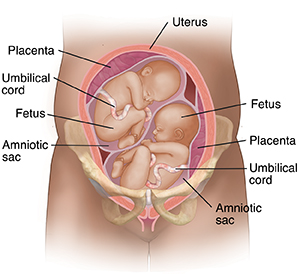A
B
C
D
E
F
G
H
I
J
K
L
M
N
O
P
Q
R
S
T
U
V
W
X
Y
Z
Click a letter to see a list of conditions beginning with that letter.
Click 'Topic Index' to return to the index for the current topic.
Click 'Library Index' to return to the listing of all topics.
When You Have a Multiple Pregnancy
How is a multiple pregnancy managed?
Your healthcare provider or midwife will talk with you about your care with you based on your pregnancy, overall health, and health history. Care will also be based on the number of fetuses you are carrying.
 |
| Twin pregnancy with two placentas. |
Care of a multiple pregnancy may involve:
-
Increased nutrition. If you are carrying 2 or more babies, you will need more calories, protein, and other nutrients, including iron. You should also gain more weight. The Institute of Medicine advises that women carrying twins who have a normal body mass index should gain between 37 and 54 pounds. Those who are overweight should gain 31 to 50 pounds, and obese women should gain 25 to 42 pounds.
-
More frequent prenatal visits. Multiple pregnancy raises the risk for complications. More frequent visits may help find problems early enough to better treat and manage them. Your nutritional status and weight should also be watched more closely.
-
Referrals. You may need a referral to a maternal-fetal medicine specialist (perinatologist). They may do special testing or ultrasound evaluations and coordinate the care of complications.
-
Maternal and fetal testing. You may need testing to watch the babies' health, especially if there are pregnancy complications.
-
Tocolytic medicines. You may be given these medicines if preterm labor happens. They help slow or stop contractions of the uterus. You may take the medicines by mouth (orally), as a shot, or through an IV (intravenous) line into a vein. Magnesium sulfate is one such medicine often used.
-
Corticosteroid medicines. Corticosteroid medicines may be given to help mature the lungs of the fetuses. Lung immaturity is a major problem of premature babies.
How are multiple pregnancies delivered?
Delivery of multiples depends on many factors, such as:
Generally, in twins, if both babies are in the head-down (vertex) position and there are no other complications, a vaginal delivery is possible. If the first baby is vertex but the second isn't, the first baby may be delivered vaginally. The second is either turned to the vertex position or delivered with buttocks presented first (breech). These procedures can increase the risk for problems, such as prolapsed cord. This is when the cord slips down through the cervical opening. Emergency cesarean (C-section) birth of the second baby may be needed. Most triplets and other higher-order multiples are born by C-section.
Vaginal delivery may take place in an operating room because of the greater risks for complications during birth and the potential need for a C-section. A C-section is often needed for:
-
Babies that are in abnormal positions
-
Certain health conditions of the mother
-
One or both babies not getting enough oxygen (fetal distress)
Online Medical Reviewer:
Donna Freeborn PhD CNM FNP
Online Medical Reviewer:
Heather M Trevino BSN RNC
Online Medical Reviewer:
Irina Burd MD PhD
Date Last Reviewed:
2/1/2023
© 2000-2024 The StayWell Company, LLC. All rights reserved. This information is not intended as a substitute for professional medical care. Always follow your healthcare professional's instructions.